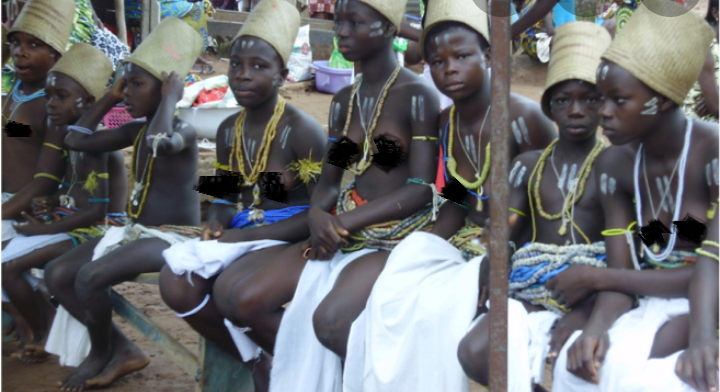The annual performance of dipo puberty rite on Kroboland has resumed after a year break due to covid -19 restrictions imposed on public gathering during the heat of the pandemic last year.
In 2020 for instance, the Yilo, the fetish priests and priestesses and other dipo initiates who attempted to perform the rite were stopped and arrested by the police. Manya-Klo traditional council also postponed the ritual.
However, Manya traditional council has given greenlight for the dipo to be performed this year.
Subsequently, a traditional ritual was performed this weekend at Naana Kloweki Wem at Kodjonya to pave way for the rest of the dipo houses to start performing dipo for teenage girls on kroboland.
The Yilo Klo Traditional Council has however, postponed the dipo performance for this again until next year due to covid-19.
The effect of this decision is that, there is likely to be a huge influx of young girls from Yilo Klo to Manya Klo to perform the dipo at the latter. Teenage girls who could not perform the rite last year will also attempt to have it done this year.
Dipo is one custom in Sub-Saharan Africa that has faced massive backlash, condemnation, and criticism from modernists, Christianity, and Human Right Activists.
But the custom continues to withstand its grounds firmly, has been resolute, and it is growing stronger by the years. The rite is performed between April and May every year.
Dipo
Dipo is a Ghanaian traditional festival celebrated by the people of the Krobo land in the Eastern region of Ghana in the month of April every year. The festival is used to usher into puberty or adulthood, girls who are virgins and it signifies that a lady, who partakes in it, is of age to be married.
Parents send their qualified girls to the chief priest who examine through rituals and tests to prove their chastity before they qualify to partake in the festival.
On the first day of the rites, the girls have their heads shaved and dressed with cloth and beads around their waist to just their knee level.
The performance of this ritual transition the teenage girls from childhood to adulthood. They are paraded to the entire community as the initiates (dipo-yo).
Early the next morning, the chief priest gives the initiates a ritual bath. He pours libation to ask for blessings for the girls. He then washes their feet with the blood of a goat which their parents presented. This is to drive away any spirit of barrenness. The crucial part of the rite is when the girls sit on the sacred stone. This is to prove their virginity.
However, any girl found to be pregnant or not a virgin is detested by the community and does not entice a man from the tribe.
The girls are then housed for a week, where they are given training on cooking, housekeeping, and child birth and nurture. The ritual mothers give them special lessons on seduction and how their husbands will expect to be treated.
They learn the Klama dance which will be performed on the final day of the rites. After the one-week schooling, they are released and the entire community gather to celebrate their transition into womanhood.


